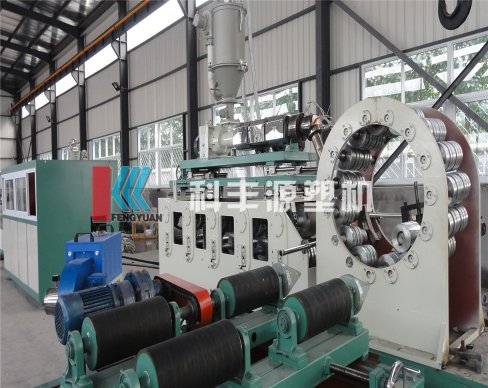Products

Polyethylene plastic steel wound pipe (SRWPE) is made of steel-plastic composite profiled strip by spiral wound welding (extrusion welding on lap surface). Its inner wall is smooth and smooth, the specification is DN200-DN2600mm. This kind of pipe has the advantages of corrosion resistance, light weight, easy installation, large flow rate and long life (50 years). It can replace the pipes made of high energy-consuming materials (cement, cast iron, ceramics, etc.). It is an environmental friendly green product.
1. Because plastic steel pipe is a new type of structural wall pipe, there is no uniform construction method standard in China. This paper introduces its construction method according to the technical data and construction specifications provided by the manufacturers, that is, trench excavation, construction drainage, foundation construction, pipeline laying, connection, closed water test and backfill. Deformation detection and control.
1.1. Trench excavation
The form of trench is determined according to construction site environment, groundwater level, soil condition, construction equipment and seasonal influence. The height of the base should be strictly controlled and the base surface should not be disturbed. The undisturbed soil above the design elevation of 0.2-0.3 m should be retained and cleaned up manually to the design elevation before piping. When over-excavation or disturbance occurs, natural graded sand and stone or crushed stone with a maximum diameter of less than 40 mm can be replaced and compacted.
1.2. Construction drainage
When the construction needs to reduce the groundwater level, the following requirements should be met: 1) Drainage pipe near the building, when reducing the groundwater level, preventive measures should be taken to prevent the impact on nearby buildings; 2) The method of reducing the groundwater level should be selected according to the permeability of the soil layer, precipitation depth, equipment conditions and so on.

Teachers of polyethylene plastic steel winding pipe equipment manufacturers also mentioned that the quality of construction dewatering should meet the following requirements: 1. No water in grooves, no water construction. The groundwater level should be lowered to 0.5 m below the bottom of the trench; 2. The groundwater level should be lowered to 0.5 m below the bottom of the trench in areas where the groundwater level is higher than the elevation at the bottom of the trench excavated; and the groundwater level should not be lowered after the pipeline is laid. When the pipeline is stable, the groundwater can be stopped.
1.3. Foundation construction
For general soil, a medium-coarse sand foundation layer with a thickness of 100 mm should be laid on the undisturbed soil foundation below the pipe bottom or on the backfilled and tamped foundation; when the soil quality is poor, a gravel foundation layer with a thickness of not less than 200 mm can be used, or it can be laid in two layers. The gravel with a diameter of 5-32 mm and a thickness of 100-150 mm can be used in the lower layer. The upper layer of coarse sand is not less than 50 mm thick. For soft soil foundation, when the bearing capacity of foundation is less than the design requirement or because of dewatering during construction, the undisturbed soil of foundation is disturbed and affects the bearing capacity of foundation, the foundation must be strengthened first, and then the medium coarse sand foundation layer should be laid after reaching the required bearing capacity. The foundation should be strengthened before the pipeline is laid when the pipeline may cause the longitudinal uneven settlement due to the pipeline load and soil change.
1.4. Pipe laying and connection
The ends of the two tubes to be connected are aligned and coaxial as far as possible. The electro-thermal melting strip is laid on the inner wall of the two tubes with supporting tools. The electro-thermal melting strip lapping interface and connection post should be located above the tubes. The supporting machine is opened to support the electro-thermal melting strip and press it on the inner wall of the tubes evenly. All the pressure plates of the machines should be neat. There is no omission to cover the hot melt zone. The hot melt welding machine (power supply) is connected with the electric heating circuit of the hot melt, and the electric heating welding is carried out according to the welding parameters such as the current and the power-on time provided by the pipe manufacturer. After welding, the machine is cooled naturally (usually more than 40 minutes). During the cooling process, the welding tool is not allowed to move, and the joint is not affected by external force. After cooling, the machine can be removed.
Top